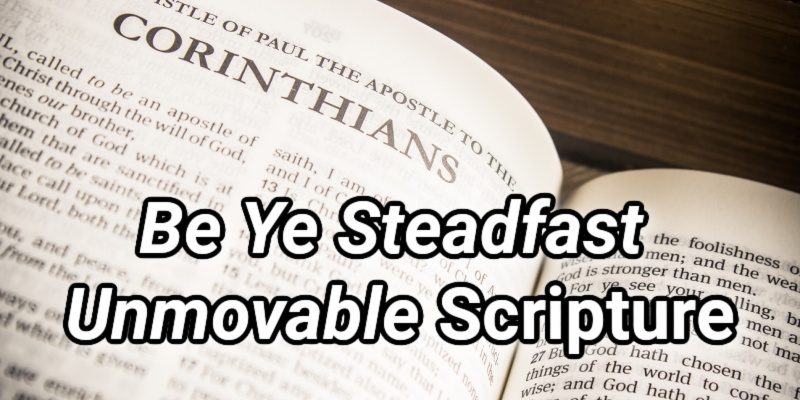Lord’s Library editors offer this introduction to the be ye steadfast unmovable Scripture from 1 Corinthians 15:58 with meaning.
In the final chapter of Apostle Paul’s first letter to the Corinthians, 1 Corinthians 15:58 serves as a powerful exhortation to the believers in Corinth, underlining the practical implications of the resurrection of Jesus Christ. The verse reads: “Therefore, my beloved brethren, be ye steadfast, unmovable, always abounding in the work of the Lord, forasmuch as ye know that your labour is not in vain in the Lord.” The be ye steadfast unmovable Scripture serves as a call for Christians to remain firm in their faith and conviction.
1 Corinthians 15 is often considered one of the most important chapters in the New Testament because it deals extensively with the resurrection. Throughout the chapter, Paul addresses misconceptions about the resurrection of the dead, which some in Corinth were questioning. He systematically argues that the resurrection of Christ is the cornerstone of the Christian faith, affirming in 1 Corinthians 15:14: “And if Christ be not risen, then is our preaching vain, and your faith is also vain.”
By establishing the truth and implication of Christ’s resurrection, Paul sets the stage for his concluding exhortation in verse 57: “But thanks be to God, which giveth us the victory through our Lord Jesus Christ.”
Be Ye Steadfast Unmovable Scripture
The admonition to “be ye steadfast, unmovable” underscores a call to be committed to the faith through life practice. The words “steadfast” and “unmovable” suggest a firmness that does not yield to pressure. This is particularly poignant given the cultural pressures the Corinthian church faced, from pagan practices to philosophical debate normal in Greek society at the time.
Paul’s directive encourages believers to remain grounded in the truths they have embraced, namely the Gospel of Jesus Christ and his resurrection.
Following the call to steadfastness, Paul exhorts the Corinthians to be “always abounding in the work of the Lord.” This phrase amplifies the previous command by adding a dynamic element to the Christian life—it is not enough to simply withstand; believers are to actively engage in good works. This suggests that understanding and accepting the resurrection is inherently linked to a vigorous, active faith that continually seeks to do God’s work.
Paul concludes the verse with a comforting assurance: “forasmuch as ye know that your labour is not in vain in the Lord.” What an encouraging Scripture! This part of the verse addresses potential discouragement among the Corinthians, who may have felt that their efforts were futile amidst external opposition and internal conflict. By reaffirming that their hard work has eternal significance and is recognized by God, Paul reinforces the value and purpose of steadfast faith and active ministry, rooted in the realities of the Blood Atonement of Christ.
It’s in these ways that the verse not only encourages perseverance in faith but also actively challenges believers to engage in the world as agents of the Gospel Truth.
1 Corinthians 15:58 serves as a vital link between doctrinal belief and practical application. Paul’s words are crafted to provide both comfort and a challenge, ensuring that the believers in Corinth—and by extension, all Christians—understand the imperishable impact of their faith and actions when anchored in the resurrected Christ.
Lord's Library is a Christian resource hub. Our editors use a variety of internet research methods like search engines, audio and video, AI, consultations with ministry leaders in the field, and more. Lord's Library should never be a substitute for reading your Bible daily as the Scriptures are to be our final authority on all matters. Lord's Library participates in affiliate programs. We may make a small commission from products purchased through this resource.
- What Does the Bible Say About Achievements? With Key Scriptures - April 11, 2025
- What does the Bible Say About Abortion? With Key Scriptures - April 11, 2025
- Prosperity Gospel Meaning in the Scriptures: Is it Biblical? - April 7, 2025















